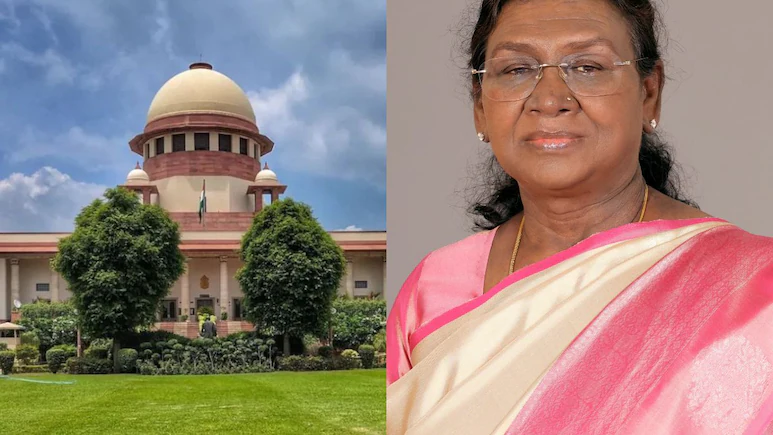New Delhi: Legal Showdown on State Bills Sparks National Debate
The Supreme Court of India is gearing up for an intricate legal battle involving the President and the governments of Kerala and Tamil Nadu concerning the assent for state bills. The issue erupted after both states opposed a presidential reference to the court’s April ruling, which clarified that governors cannot reserve bills for presidential assent if they had previously withheld their consent. The core question revolves around whether the President must affirmatively act on all bills within a stipulated timeline, specifically three months after they have been passed by the state legislatures.
At the heart of this legal inquiry are President Droupadi Murmu’s inquiries submitted to the Supreme Court, which include 14 pointed questions aimed at elucidating the extent of the judiciary’s authority in imposing timelines on both governors and the President regarding state bill approvals. The legal confrontation has drawn both support and condemnation from various political corners, raising major constitutional questions about the balance of power among different branches of government.
The Supreme Court, led by Chief Justice BR Gavai, has indicated it will conduct a thorough examination of the issues raised. During the initial hearing on the matter, which took place on Tuesday morning, the court dismissed the objections put forth by Kerala and Tamil Nadu but assured a comprehensive hearing to address the critical issues at stake. The five-judge bench has directed both the states and the central government to submit their replies within a week, with the next hearing likely scheduled for August.
Kerala’s Left Democratic Front and Tamil Nadu’s Dravida Munnetra Kazhagam (DMK) have exhibited staunch opposition to any hearings on President Murmu’s letter to the Supreme Court made in May, signaling a potential escalation of the political tensions surrounding this legal matter.
Tensions Rise as Political Leaders Weigh In
The political ramifications of the ongoing legal tussle have not gone unnoticed. Notably, Tamil Nadu Chief Minister MK Stalin has been vocally critical of what he perceives as attempts by the central government to subvert democratic processes. He denounced the inquiries made by the President as a “desperate attempt to weaken democratically elected state governments” and criticized the overarching influence of the BJP-led central government over regional governance.
The atmosphere around this case has also been charged, with comments from Solicitor General Tushar Mehta, who represents the central government, causing a stir. He likened repeated requests by the states to a romantic proposal, stating, “… repeated requests (referring to the states’ challenges) are only successful if a man is proposing to a girl,” which drew ire from various political factions. These remarks underscore the heightened emotions surrounding the issue of gubernatorial and presidential powers, as well as their implications for state governance.
The legal complexities are compounded by the fact that 10 bills sent to the Tamil Nadu government in April have already been signed into law, following the Supreme Court’s earlier ruling that Governor RN Ravi had overstepped his authority by withholding assent. Legal experts point out that the upcoming Supreme Court hearings could have far-reaching implications for how future state legislation is managed and approved, both at the gubernatorial and presidential levels.
As per the report by The Hindu, the Supreme Court previously ruled that states’ bills should be recognized as having cleared the legislative process if they have been re-presented to the governor after initial withholding of assent. This judgment has come under scrutiny in light of the President’s questions regarding the legitimacy of laws enacted without the governor’s approval, highlighting a critical area of contention that the Supreme Court will need to address.
Potential National Impact on Governance
The implications of this Supreme Court ruling extend beyond mere state-versus-center politics. Observers are particularly interested in how the judiciary will navigate the delicate balance between ensuring accountability in the legislative process and allowing states the autonomy to govern effectively. Chief Justice Gavai has already signaled that the ramifications of this case will affect not only the two involved states but could also set a precedent impacting governance across India.
A critical aspect of the upcoming hearings will likely involve examining the constitutional provisions guiding the relationship between state legislatures, governors, and the President. The ongoing legal battles have placed a spotlight on Article 143 of the Constitution, which permits the President to seek the Supreme Court’s opinion on legal matters—an authority that is now being challenged by the states involved.
Adding complexity to the situation, the relationship between the BJP and the regional parties in the southern states continues to evolve, particularly with upcoming elections looming. Political analysts believe that the outcomes of this legal inquiry could significantly influence the campaign strategies of both the ruling party and its opposition.
In light of these developments, citizens and political observers alike will be closely monitoring the Supreme Court’s decisions as they unfold. The clarifying statements from the judiciary are expected to provide guidance on the constitutional boundaries of executive authority and legislative autonomy, thus shaping the future of India’s democratic framework.
For more insights into the implications of this high-stakes case, visit our in-depth analysis on India Today and to understand the broader context of gubernatorial powers, check out this article from The Wire.
DISCLAIMER
We have taken every measure to ensure that the information in this article and on our social media platforms is accurate, verified, and obtained from reliable sources. For feedback or complaints, please contact us at info@hamslive.com.


